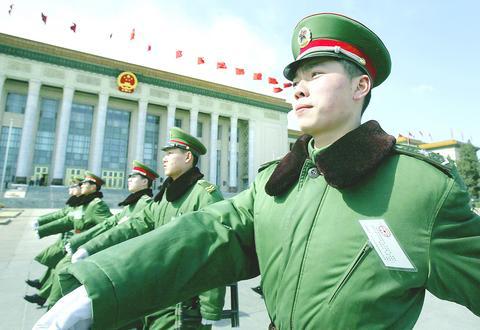Hundreds of Chinese police fanned out across Beijing yesterday, trailed dissidents and swept out-of-town petitioners away from government offices to boost security a day before the annual session of parliament.
Civilians wearing red armbands helped to keep order near the Great Hall of the People, venue of the March 5-14 session of the National People's Congress, and extra police were deployed at almost every nearby bus stop.
Officers and bomb-sniffing dogs patrolled opposite the Great Hall in Tiananmen Square, the focus of the student-led protests that ended in bloodshed in 1989, and extra precautions were taken at the dozens of hotels where the 3,000 deputies are staying.

PHOTO: AFP
Officials in the capital boosted a crackdown on petitioners and on the Falun Gong sect to ensure the safety of leaders and delegates and to prevent bombings, shootings or other terror attacks, Hong Kong's Beijing-backed Wen Wei Po newspaper said.
"Destabilizing factors that affect the capital's stability still exist," the Beijing Daily quoted the city's Communist Party chief, Liu Qi (
Violence is not unknown before the parliament session.
Beijing was rocked by bombings at two of the country's most prestigious universities in February last year. The blame was put on a man seeking publicity who was subsequently jailed for life.
A bomb exploded on a public bus in a busy shopping district in February 1997, wounding about 10 people and police suspected Muslim Uighur separatists from the far northwest.
The Paris-based media watchdog Reporters Without Borders said China had closed down some Internet chatrooms before the session.
In a landmark move, parliament will amend the Constitution and add a proposal by the Communist Party, which has ruled with an iron fist since 1949, to "respect and safeguard human rights."
But pro-democracy activist Jiang Qisheng saw no sign of change. He has been put under round-the-clock police surveillance since Feb. 24 and tailed by more than a dozen plainclothes police in two cars, one motorcycle and two bicycles.
"They told me: `Wherever you go, we go,'" Jiang said. "This is a violation of my human rights.
"They used to post their men at the entrance downstairs. Now, they're on the 13th floor outside my home," said Jiang, who was freed last year after serving four years in prison for incitement to subversion.
He was jailed for one-and-half years for his role in the 1989 protests.
Stability is the watchword. Police view disgruntled petitioners as a security threat.

A fire caused by a burst gas pipe yesterday spread to several homes and sent a fireball soaring into the sky outside Malaysia’s largest city, injuring more than 100 people. The towering inferno near a gas station in Putra Heights outside Kuala Lumpur was visible for kilometers and lasted for several hours. It happened during a public holiday as Muslims, who are the majority in Malaysia, celebrate the second day of Eid al-Fitr. National oil company Petronas said the fire started at one of its gas pipelines at 8:10am and the affected pipeline was later isolated. Disaster management officials said shutting the

US Vice President J.D. Vance on Friday accused Denmark of not having done enough to protect Greenland, when he visited the strategically placed and resource-rich Danish territory coveted by US President Donald Trump. Vance made his comment during a trip to the Pituffik Space Base in northwestern Greenland, a visit viewed by Copenhagen and Nuuk as a provocation. “Our message to Denmark is very simple: You have not done a good job by the people of Greenland,” Vance told a news conference. “You have under-invested in the people of Greenland, and you have under-invested in the security architecture of this

Japan unveiled a plan on Thursday to evacuate around 120,000 residents and tourists from its southern islets near Taiwan within six days in the event of an “emergency”. The plan was put together as “the security situation surrounding our nation grows severe” and with an “emergency” in mind, the government’s crisis management office said. Exactly what that emergency might be was left unspecified in the plan but it envisages the evacuation of around 120,000 people in five Japanese islets close to Taiwan. China claims Taiwan as part of its territory and has stepped up military pressure in recent years, including

UNREST: The authorities in Turkey arrested 13 Turkish journalists in five days, deported a BBC correspondent and on Thursday arrested a reporter from Sweden Waving flags and chanting slogans, many hundreds of thousands of anti-government demonstrators on Saturday rallied in Istanbul, Turkey, in defence of democracy after the arrest of Istanbul Mayor Ekrem Imamoglu which sparked Turkey’s worst street unrest in more than a decade. Under a cloudless blue sky, vast crowds gathered in Maltepe on the Asian side of Turkey’s biggest city on the eve of the Eid al-Fitr celebration which started yesterday, marking the end of Ramadan. Ozgur Ozel, chairman of the main opposition Republican People’s Party (CHP), which organized the rally, said there were 2.2 million people in the crowd, but